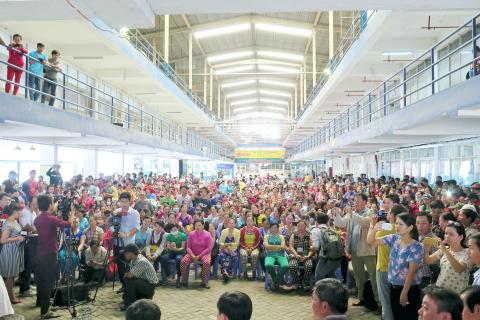Thousands of Vietnamese workers at a major footwear factory were on strike for a sixth day yesterday over a social insurance law in a rare challenge to government policy.
Several thousand people at the Taiwanese-owned Pou Yuen factory in Ho Chi Minh City began the stoppage on Thursday last week.
Pou Yuen Vietnam, which employs more than 80,000 workers, is a subsidiary of Pou Chen Group. As many as 90,000 of the workers went on strike last week, the online newspaper VnExpress reported.

Photo: Reuters
It is unclear which shoemakers the facility supplies to. Workers said they make footwear for Nike and other companies, while Nike has denied sourcing from the factory affected.
The workers continued the peaceful strike in the factory’s compound yesterday under a heavy police presence. They marched along Highway 1 with banners and beating drums on Monday and Tuesday, blocking traffic on the main road artery.
They are protesting a new law, which is scheduled to take effect next year and says that workers will get a social insurance monthly allowance when they retire instead of getting a one-time payment if they resign. The striking workers said that if they quit earlier, they would have to wait until retirement age — 60 for men and 55 for women — to get the allowance, and they prefer the lump sum to pay for their daily needs while seeking new jobs.
Workers have also said they are concerned the money may not be there in the future.
“The workers want to raise their voices and speak out on this government policy,” Serena Liu (劉美德), chairwoman of the Council of Taiwanese Chamber of Commerce in Vietnam, told Bloomberg by telephone. “They feel this is the only way they can do it. It’s not about working conditions.”
Pou Chen called on the Vietnamese government to provide assurances to workers on the social insurance issue, Pou Chen spokesman Amos Ho (何明坤) told Bloomberg by telephone.
The work stoppage, which began on Thursday last week, may cause some production delays, Ho said.
Vietnam is hit by several hundred labor strikes a year, but they are mostly over poor working condition and low pay. Protests over government policies are rare.
Vietnamese Vice Minister for Labor Doan Mau Diep on Tuesday met with the workers and said that his department would propose to allow them to choose whether to get one-time social insurance benefits when they quit or receive them upon retirement. His words were met with applause from the workers, according to state media reports, but if was not clear that he had persuaded them to stop the strike.
Vietnam General Confederation of Labor president Dang Ngoc Tung said in a statement on the trade union’s Web site that the strikers should return to work and authorities will address their concerns.
He also told them not to allow “bad elements” to take advantage of the situation to stir up unrest that would affect security, order and the company’s operations.
This story has been amended since it was first published.

Yemen’s separatist leader has vowed to keep working for an independent state in the country’s south, in his first social media post since he disappeared earlier this month after his group briefly seized swathes of territory. Aidarous al-Zubaidi’s United Arab Emirates (UAE)-backed Southern Transitional Council (STC) forces last month captured two Yemeni provinces in an offensive that was rolled back by Saudi strikes and Riyadh’s allied forces on the ground. Al-Zubaidi then disappeared after he failed to board a flight to Riyadh for talks earlier this month, with Saudi Arabia accusing him of fleeing to Abu Dhabi, while supporters insisted he was

The Chinese Embassy in Manila yesterday said it has filed a diplomatic protest against a Philippine Coast Guard spokesman over a social media post that included cartoonish images of Chinese President Xi Jinping (習近平). Philippine Coast Guard spokesman Jay Tarriela and an embassy official had been trading barbs since last week over issues concerning the disputed South China Sea. The crucial waterway, which Beijing claims historic rights to despite an international ruling that its assertion has no legal basis, has been the site of repeated clashes between Chinese and Philippine vessels. Tarriela’s Facebook post on Wednesday included a photo of him giving a

Syrian President Ahmed al-Sharaa on Sunday announced a deal with the chief of Kurdish-led forces that includes a ceasefire, after government troops advanced across Kurdish-held areas of the country’s north and east. Syrian Kurdish leader Mazloum Abdi said he had agreed to the deal to avoid a broader war. He made the decision after deadly clashes in the Syrian city of Raqa on Sunday between Kurdish-led forces and local fighters loyal to Damascus, and fighting this month between the Kurds and government forces. The agreement would also see the Kurdish administration and forces integrate into the state after months of stalled negotiations on

‘MOBILIZED’: While protesters countered ICE agents, Minnesota Governor Tim Walz activated the state’s National Guard to ‘support the rights of Minnesotans’ to assemble Hundreds of counterprotesters drowned out a far-right activist’s attempt to hold a small rally in support of US President Donald Trump’s latest immigration crackdown in Minneapolis, Minnesota, on Saturday, as the governor’s office announced that National Guard troops were mobilized and ready to assist law enforcement, although not yet deployed to city streets. There have been protests every day since the US Department of Homeland Security (DHS) ramped up immigration enforcement in the Twin Cities of Minneapolis and Saint Paul by bringing in more than 2,000 federal officers. Conservative influencer Jake Lang organized an anti-Islam, anti-Somali and pro-US Immigration and Customs Enforcement